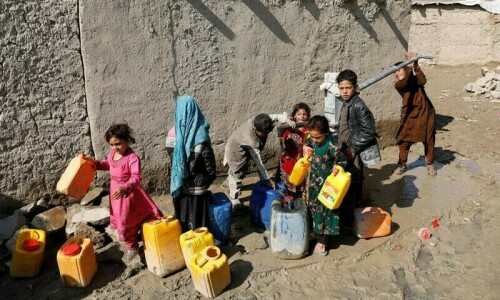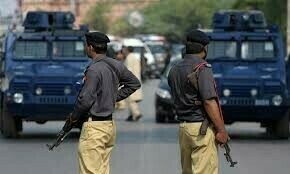
ISLAMABAD: The ‘red zone’ in Islamabad on Wednesday gave the look of a battleground when charged workers of the Pakistan Peoples Party (PPP) and police clashed during the appearance of party chairman Bilawal Bhutto-Zardari before the National Accountability Bureau (NAB) in connection with the inquiry into construction of a multi-storey building owned by Zardari Group in Karachi.
Almost at the same time, PPP activists and personnel of law enforcement agencies deployed outside the Islamabad High Court remained at a distance from each other when former president Asif Zardari and his sister Faryal Talpur appeared in the court to seek bail extension in the fake bank accounts case.
The police used a water cannon, teargas shells and batons to prevent the PPP workers from marching towards the NAB office to show solidarity with the party chairman who was being quizzed by the bureau officers and was later given a questionnaire.
Security had been tightened in Islamabad ahead of Mr Bhutto-Zardari’s appearance before Rawalpindi NAB, with roads leading to the office closed to traffic and law enforcement officials deployed around the premises.
A notification issued by the capital administration a day earlier had directed the home secretaries of Khyber Pakhtunkhwa and Punjab to ensure that political workers were prevented from entering the capital territory.
Over dozen activists injured, two women MNAs, journalists among 25 briefly detained
Police arrested about 25 party activists and two woman MNAs but later released them when the situation returned to normality after a couple of hours.
Later, speaking at a news conference, the PPP chairman “condemned” the police action against the party workers and termed it an instance of “state brutality.”
Mr Bhutto-Zardari regretted that “the government of Imran Khan” had “attacked” the peaceful party workers who, according to him, had gathered on their own, despite the fact that neither emergency was declared nor Section 144 imposed in Islamabad.
“I don’t even say peaceful protesters as they weren’t protesting,” he added.
“This is not new for the PPP and its workers. We do not fear such tactics nor will we change our principles and ideology,” he said.
Mr Bhutto-Zardari alleged that Prime Minister Khan “under a conspiracy” wanted to impose “one-party rule” in the country and his government was victimising those politicians, civil society activists and even journalists who had been coming up with constructive criticism on the government.
Hitting out at the government, he dubbed the prime minister “incompetent” to run the country and said Mr Khan had resorted to the use of “extreme force” to hide his incompetency.
“The country can face political and economic instability with such an attitude and by turning the capital into a war zone,” the young PPP chairman said.
Mr Bhutto-Zardari, who is also the chairman of the National Assembly Committee on Human Rights, said he had asked for video footage of the police action against the party workers and would take a legal course.
Replying to a question, he said the NAB officers had inquired from him about a company of which he had become a share-holder when he was a school-going boy. He said the NAB officers quizzed him for 20 minutes and later handed him over a questionnaire to which he would respond after consulting his lawyers.
Mr Bhutto-Zardari also lashed out at NAB, alleging that Article 10-A of the Constitution which ensured fair trial was being undermined.
In an apparent reference to the last week’s release of the controversial audio-video tapes of NAB Chairman retired Justice Javed Iqbal, he said the government wanted to control every institution through “blackmailing.”
Mr Bhutto-Zardari said the “selected prime minister” wanted to have “selected judges and selected journalists” in the country. He said there were reports that the government now wanted to remove some of the judges and replace them with its “hand-picked” people.
“This government wants to remove judges like Musharraf did (in 2007),” he added.
Responding to another question, he said the PPP had already given the call for protests after Eid and said it was the duty of all democratic forces to take to the streets to prevent the attacks on democracy and fundamental rights of the citizens. He said they were coming out on roads not to topple the government, but for restoration of democratic, economic and human rights in the country.
The PPP chairman said they might not need to make any effort to remove the government as they had heard that the Balochistan National Party of Akhtar Mengal had decided not to vote for the government during the passage of the federal budget.
He said despite having reservations, they had been appearing before these institutions like his mother Benazir Bhutto who also appeared before the courts despite calling them “kangaroo courts.”
Mr Bhutto-Zardari said the situation in the country was similar to that of 2006 when Gen Musharraf was ruling the country.
In a reference to the May 26 incident in North Waziristan, he said if the capital could face such a situation then one could imagine “what will be happening in the tribal areas.” He once again asked the National Assembly speaker to issue a production order of MNA Ali Wazir so that he could come to the house on Friday and apprise them about the incident.
He questioned the silence of the prime minister and the Khyber Pakhtunkhwa chief minister over the incident.
In response to a question, he said Bangladesh got separation from Pakistan when they had compromised on democracy. He said the federation strengthened with democracy.
Meanwhile, sources said that NAB authorities had served a 32-point questionnaire to the PPP chairman and some questions were related to the fake bank accounts and money laundering cases.
A NAB official told Dawn that they could have sent the questionnaire to the PPP chairman but most of the time accused persons claimed that they had not received any letter from the bureau. “That is why we handed over the questionnaire personally to Mr Bhutto-Zardari,” he added.
Clashes
Over a dozen PPP activists were injured during the physical confrontation with the police.
Officials of the capital police and administration said the Red Zone was partially sealed with barbed wires and pickets, besides over 1,500 policemen were deployed in and around the Red Zone to maintain law and order and counter assemblies of PPP workers.
Despite these measures, a sizeable number of PPP workers led by various party leaders gathered at Ayub Chowk and D-Chowk where the police, including Anti-Riot Unit and Counter Terrorism Force intercepted them.
Two woman MNAs – Mussarat Mahesar and Dr Sobia Soomro -- were among those who were detained for a brief period at a police station.
Former prime minister Raja Pervez Ashraf was also seen requesting the police officials to allow him to go to NAB office, reminding them that once he was their prime minister.
The police also manhandled a couple of journalists and even arrested them and shifted to the police station.
Syed Irfan Raza also contributed to the report
Published in Dawn, May 30th, 2019















































